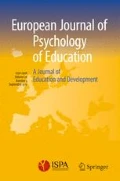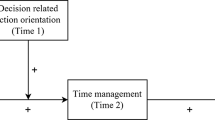Abstract
In order to understand and predict students’ achievement and persistence at learning activities, many contemporary motivational models consider how much students are motivated for their school work. However, students’ achievement and persistence might not only be affected by their amount of study motivation, but also by the motivation to engage in competing alternative activities, as suggested three decades ago by Atkinson and Birch in their “Dynamics of Action” (1970). Building on this line of theorizing, the present contribution indicates that it is not only instructive to consider the level of students’ motivation for these competing activities, but also the type of activities they engage in, that is leisure vs. working activities. Two studies demonstrated that whereas time spent on working activities is inversely related to study motivation, attitude, persistence and academic achievement, such relationships were not found for leisure time engagement. Spending some time on leisure time activities does not interfere with optimal learning.
Résumé
Dans le but de comprendre et de prédire la performance et la persistance des étudiants dans des activités d’apprentissage, plusieurs théories contemporaines de la motivation considèrent l’intensité de la motivation des étudiants à l’endroit de leur travail scolaire. Cependant, la performance et la persistance des étudiants peuvent dépendre non seulement de l’intensité de la motivation à l’étude, mais aussi de la motivation à s’engager dans des activités différentes, comme l’ont déjà suggéré Atkinson et Birch dans leur ‘Dynamics of action’ (1970). Se basant sur cette théorie, le présent article propose de considérer non seulement le niveau de motivation des étudiants pour ces activités différentes, mais aussi le type d’activité (loisir vs travail). Deux études démontrent que le temps passé au travail est inversement relié à la motivation et à la persistance à l’étude, à l’attitude (positive) envers l’étude et au rendement scolaire; une telle relation n’est pas apparue pour le temps consacré aux loisirs. Un certain temps de détente ne nuit pas à l’apprentissage optimal.
Similar content being viewed by others
References
Atkinson, J.W., & Birch, D. (1970).The dynamics of action. New York: Wiley.
Atkinson, J.W., & Birch, D. (1978).Introduction to motivation (2nd edition). New York: Van Nostrand
Buelens M., & Lacante, M. (1998).Drop out in het hoger onderwijs van één cyclus. Een onderzoek naar de redenen van studiestaken bij eerstejaarsstudenten van de Katholieke Hogeschool Leuven [Drop out in higher education of one cycle. Research into the causes of drop out among first year students of the KHLeuven]. Unpublished master thesis. Katholieke Universiteit Leuven, Belgium.
Creten, H., Lens, W., & Simons, J. (2001). The role of perceived instrumentality in student motivation. In A. Efklides, J. Kuhl & R.M. Sorrentino (Eds.),Trends and prospects in motivation research (pp. 37–45). Dordrecht: Kluwer Academic Publishers.
Creten, H., Nijsmans, I., Lens, W., Douterlungne, M., & Cossey, H. (1998).Algemene vakken en beroepsleerlingen: Op dezelfde golflengte? Motivatie van leerlingen en functioneren van leerkrachten algemene vakken in het beroepssecundair onderwijs [Theoretical courses in vocational secondary education: Are they on the same wave-length?]. Leuven: Department of Psychology & HIVA.
Deci, E.L., & Ryan, R.M. (1985).Intrinsic motivation and self-determination in human behavior. New York: Plenum.
Deci, E.L., & Ryan, R.M. (2000). The ‘what’ and ‘why’ of goal pursuits: Human needs and the self-determination of behavior.Psychological Inquiry, 11, 227–268.
Gergen, K.J. (1991).The saturated self: Dilemmas of identity in contemporary life. New York: Basic Books.
Herrera, D. (2002).Social insertion of high school graduates in Lima: A socio-psychological study. Unpublished doctoral dissertation, University of Leuven, Leuven, Belgium.
Iyengar, S.S., & Lepper, M.R. (2000). When choice is demotivating: Can one desire too much of a good thing?Journal of Personality and Social Psychology, 79, 995–1006.
Lacante, M., Lens, W., De Metsenaere, M., Van Esbroeck, R., de Jaeger, K., de Coninck, T., & Santy, L. (2002).Drop-out in het eerste jaar hoger onderwijs Dropout in the first year of higher education (Eindrapport OBPWO 98.11). Brussel/Leuven: Wrije Universiteit Brussel/Katholike Universiteit Leuven.
Locke, E.A., & Latham, G.P. (1990).A theory of goal setting and task performance. Englewood Cliffs, NJ: Prentice Hall.
McCown, W.G., Latham, G.P. (1990). An experimental study of some hypothesized behaviors and personality variables of college student procrastinators.Personality and Individual Differences, 8, 781–786.
Pintrich, P.R., & Schunk, D.H. (2002).Motivation in education: Theory, research, and applications (2nd edition). Upper Saddle River, NJ. Merrill-Prentice Hall.
Roede, E. (1989).Explaining student investment: An investigation of high school students’ retrospective causal accounts of their investment in school Amsterdam: SCO-University of Amsterdam.
Schwartz, B. (2000). Self-determination: The tiranny of freedomAmerican Psychologist, 55, 79–88.
Vanheste, T., Lens, W., & Vandenberghe, R. (2001).Motivatie en leerstijlen bij eerstejaarsstudenten aan de universiteit [Motivation and learning styles among college freshmen] Leuven: University of Leuven.
Vansteenkiste, M., Simons, J., Soenens, B., & Lens, W. (2004). How to become a persevering exerciser? Providing a clear, future intrinsic goal in an autonomy supportive way.Journal of Sport and Exercise Psychology, 26, 232–249.
Vansteenkiste, M., Lens, W., De Witte, S., Dewitte, H., & Deci E.L. (2004). The ‘why’ and ‘why not’ of job search behavior: Their relation to searching, unemployment experience, and well-being.European Journal of Social Psychology, 34, 345–363.
Weinstein, C.E., Palmer, D.H., & Schulte, C. (1987).Learning and study strategy inventory. Clearwater, FL: H & H Publishing Company.
Author information
Authors and Affiliations
Corresponding author
Additional information
Part of this research was supported by grant OBPWO 98.11 (Ministry of Education, Flanders, Belgium). The third author’s contribution was supported by a grant from Scientific Research Flanders (FWO-Vlaanderen).
Rights and permissions
About this article
Cite this article
Lens, W., Lacante, M., Vansteenkiste, M. et al. Study persistence and academic achievement as a function of the type of competing tendencies. Eur J Psychol Educ 20, 275–287 (2005). https://doi.org/10.1007/BF03173557
Received:
Revised:
Issue Date:
DOI: https://doi.org/10.1007/BF03173557




